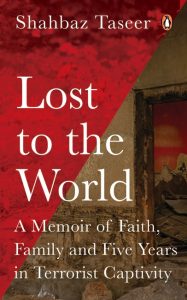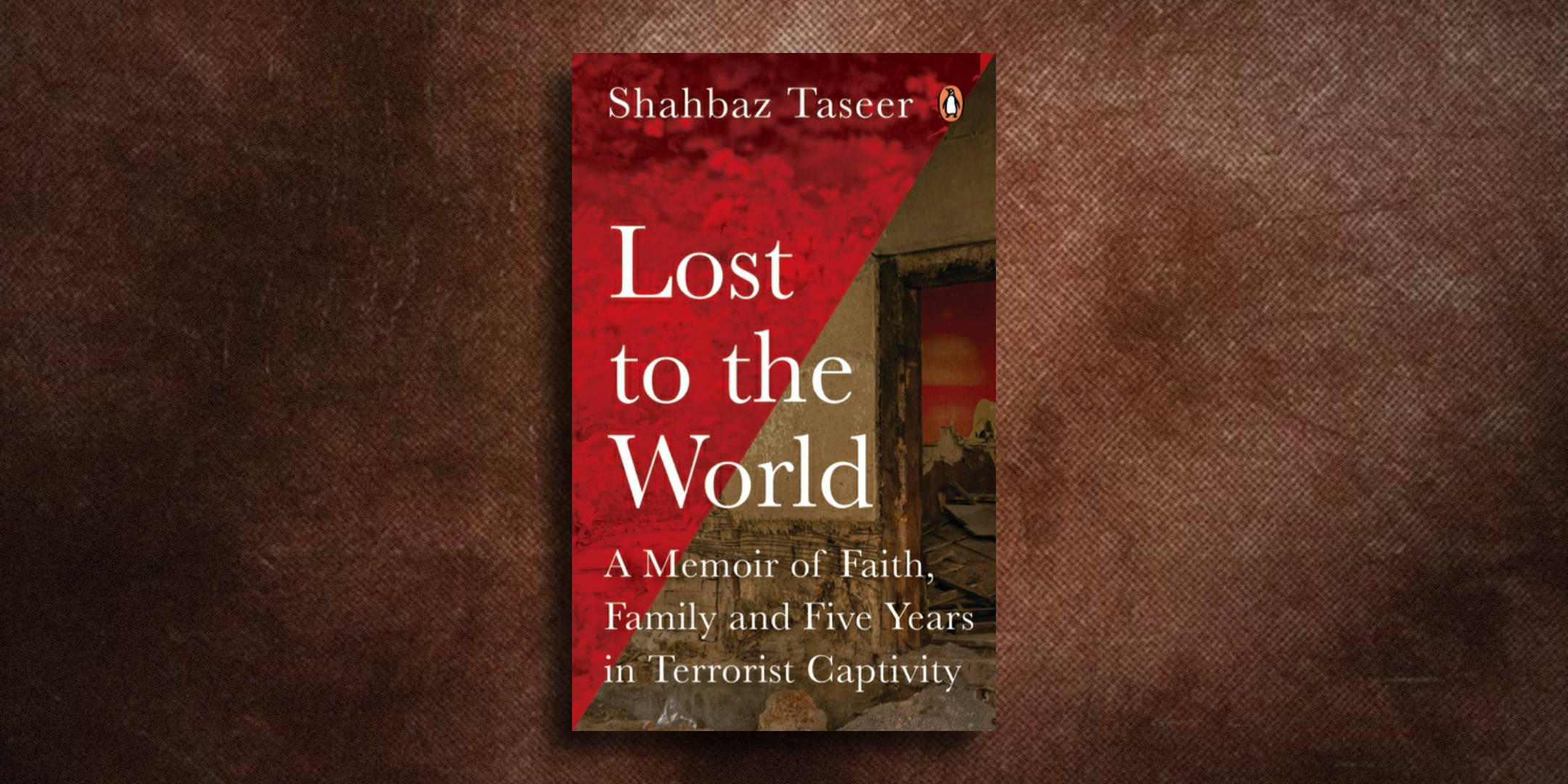Discover an extraordinary tale of resilience and injustice with Lost to the World by Shahbaz Taseer. In this gripping memoir, Taseer recounts his shocking encounters of being wrongfully accused by the FBI, enduring racial profiling, and the unimaginable ordeal of being held captive by the Taliban for nearly five years.
Dive into this powerful narrative and witness the author’s unwavering spirit that emerges in the face of adversity.

***
In 2010, about a year before I was kidnapped, I took my wife on a long-planned trip to California. Overall, it was a wonderful, if slightly exhausting, trip.
The journey from California to Lahore is an especially long haul, almost twenty-four grueling hours in total flight time. We arrived at SFO airport and boarded our plane to New York. The flight was delayed and delayed further. We sat with our fellow passengers, restless and waiting for updates. I tried to settle in and catch some sleep.
FBI agents boarded the aircraft, arrested the two of us, and took us off the plane.
It’s hard to express just how humiliating it is to be led in handcuffs off a plane full of strangers, all of whom assume you are criminals, terrorists, or worse. I’ll always be grateful for one sympathetic young college kid who stood up and started making a video on his smartphone and telling the officers this was an injustice, that we were being racially profiled. He was right. There was no other explanation for it.
They pushed my wife and me into separate cars. I could see Maheen sitting in the back seat of her car, looking confused, outraged, and worried. I tried to mouth some words to her to reassure her, so she wouldn’t feel anxious. But the agents saw us trying to communicate, so they repositioned the cars so we could no longer see each other.
Meanwhile, the remaining passengers were being evacuated. The FBI agent informed us that someone had made an anonymous call about the flight, claiming a bomb threat. By now, a bomb disposal unit had arrived on the tarmac and was boarding the plane with dogs to search the cabin. As far as Maheen and I knew, there might well have been a bomb on board, a terrifying prospect. We also knew for sure that we weren’t responsible for it. Watching all this unfold, both Maheen and I had the same thoughts, in our separate vehicles. Apparently, everyone thinks we were going to blow up this plane. And now they have left us here, parked under the wing, while they search for a bomb. If there is a bomb on board, and it goes off, we’ll not only explode along with the plane, but we’ll forever be blamed for being the ones who planted it. They’d say, “We got the right people. They were guilty all along.”
Maheen and I sat on the tarmac for another hour or so, before the agents finally drove us to the terminal. Again, we were kept separate—I was led to one room while my wife was taken to another; we weren’t given a chance to speak. After sitting in the plane for hours, then on the tarmac, I was beyond embarrassed—I was outraged.
When I reached the small interrogation room, two agents greeted me and pulled the good-cop / bad-cop routine on me. It was like a scene out of Lethal Weapon. The bad cop barked, “Do you know why you’re here?”
“Not really. But I did see a bomb disposal unit.”
“You’re here because we suspect you tried to hijack and bomb that plane. And we’re checking your bags right now for bombs and ammunition.”
“The only thing inside my bag that’s even slightly suspicious is an iPad that I just bought. And it’s still in the plastic wrap. So, if you open it and find a bomb inside, that’s Apple’s fault, not mine.
I answered all of their questions honestly and forthrightly, but I didn’t react with anything like calm or poise. My anger at being singled out like this—at being hauled from our flight in handcuffs because someone thought a Pakistani man in a Lakers jersey and his wife wearing a beanie must obviously be a couple of terrorists—spilled over. Ever since 9/11, if you fly internationally on a Pakistani passport, you can expect undue attention. You will be pulled “randomly” from lines for extra security screening and be subjected to rigorous questioning by anyone whose job is guarding a border. Still, I’d always thought of myself as westernized, I fit right in. I was Shabby T!
I went to an American school. I listened to American music. I could recite whole Jay-Z albums from memory. My favorite junk food is McDonald’s. There’s nothing quite like twenty pieces of McNuggets.
None of this mattered to the agents questioning me or to the people who’d profiled us and made that call. To them, I was a Pakistani, and that meant a terrorist. We’d come for a relaxing vacation and now we were each stuck in a windowless room, defending ourselves against charges of terrorism.
At one point, frustrated, I may have pulled the “Do you know who I am?” card.
They did not know.
“My father is Salmaan Taseer. He’s the serving governor of Punjab province. Right now, Senator John Kerry is with my father distributing flood relief aid in Pakistan. Hillary Clinton has been to the governor’s house for tea.”
Lest I forget to mention, being the governor’s son, I was entitled to an official passport, known as the blue passport.
Slowly, I could see it dawn on both the good cop and the bad cop that they’d gotten it horribly wrong. It’s one thing to pull a random person off a commercial aircraft and label him a terrorist. It’s another when that person’s father is a high-serving official known to the U.S. secretary of state.
Their whole tone changed. They began damage control. They apologized for the mix-up. My wife and I were reunited; she was equally traumatized.
To compensate for their behavior, the agents picked up our suitcases and led us through an empty luggage hall toward the exit doors. On one level, I understood they were simply doing their jobs, protecting innocent people from real threats. I also accepted that this was a new reality. It evoked mixed feelings of not only anger and resentment but also sadness that the world, as we knew it, had descended into such a dark place where racial profiling had been legalized.
As we were leaving, an agent stopped us and said, “By the way, you guys might get these media people coming at you. Just ignore them. Let that go. Just go home safely!”
My friend Harris and his father met us outside the terminal. Harris’s dad was sympathetic, comforting us as he helped us into the car. Harris, meanwhile, was insisting that he knew a good lawyer if we wanted to sue. Then my phone rang.
It was my father calling, deeply concerned. “I just heard the news, are you okay?”
I was rattled and much shaken, but I didn’t convey that to my father, who always said I was the most stoic person he knew.
Despite all this, my bubble of privilege was more or less intact. I had my family, my home, my work, my life. I thought nothing could shake those fundamental truths.
I was wrong about that too. Even before I was kidnapped, life had one more unfortunate awakening for me
***
Get your copy of Lost to the World by Shahbaz Taseer from your nearest bookstore or on Amazon







